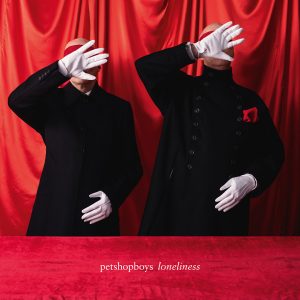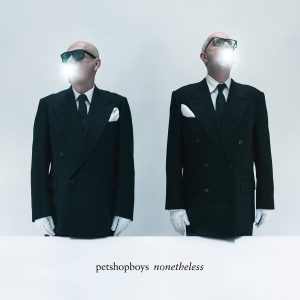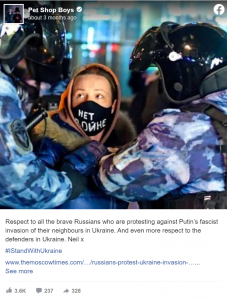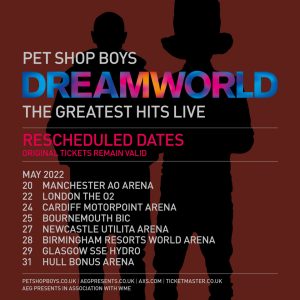Neil Tennant will try his hand at anything – including composing the score for a screening of silent movie classic Battleship Potemkin in Trafalgar Square next week. Here he talks about Iraq, being selfish and why rock festivals are horrible As a curious, erudite 50-year-old with an interesting life, Neil Tennant is entertaining on almost anything you care to throw at him – music, art, politics, travel – and as an ex-journalist (he wrote for Smash Hits from 1982-85), he’s careful to entertain in quotable form. You could just leave Neil alone with your tape recorder, let him rattle on for an hour, come back and you would have more than enough material for an article. Mostly, he’s interviewed with his fellow Pet Shop Boy, Chris Lowe, who doesn’t talk as much. What Chris does is punctuate Neil’s flow, deflate his theories with a daft comment or snuffly jokes. This corresponds with the way their music is commonly viewed: Neil’s romantic, clever lyrics, skewered and made hilarious by Chris’s disco-bunny beats. Though, of course, it’s not as simple as that. Plus, the Pet Shop Boys have often chosen to branch out from straightforward pop – into art (collaborating with Sam Taylor-Wood), West End musicals (they wrote Closer To Heaven with Jonathan Harvey) and one-offs, such as co-compiling an LP of Noël Coward songs or writing a piece of music to accompany 1999’s total eclipse. Over the 23 years they’ve been together, they’ve worked with people as varied as Zaha Hadid, Derek Jarman, Dusty Springfield, Liza Minnelli, Bruce Weber, Martin Parr and Johnny Marr. Although we are in a recording studio, today isn’t a straightforward pop day – as we shall see. Well, Chris is in the studio with a couple of techno boffins and DJ/producer Dave Dorrell; Neil and I are in the room next door. Chris isn’t doing this interview. Probably because he can’t be bothered. Doesn’t that annoy Neil? ‘Oh no. Chris and I are very different people, but we never really fall out,’ says Neil. ‘Occasionally we bicker a bit. But we’ve known each other such a long time, and though this sounds corny and showbiz, we still make each other laugh. And we’ve been through things that no one else has been through. There’s no one else I know who has had a number one in America, and has written a score to Battleship Potemkin.’ The number one in America was in 1986, with the Pet Shop Boys’ very first hit single, ‘West End Girls’; the Battleship Potemkin part will happen next Sunday in Trafalgar Square and is why they’re in a recording studio. A free event – ‘we’ve always liked an event’ – produced by the ICA. Sergei Eisenstein’s groundbreaking silent film will be shown on a vast screen in front of Nelson’s column, while Neil and Chris perform their new score live. They’ve brought in the Dresden Sinfonica to play some of it, and have engaged Theatre de Complicite’s Simon McBurney for the staging. Which all adds up to something much more than just pictures and music. ‘Well, you have to fulfil the potential. Or at least try to fulfil the potential. Often we miss, but we do always try.’ Neil is nervous about what’s going to happen: ‘I keep waking up in the night, panicking.’ There are so many factors – whether anyone will turn up (free events mean no advertising and a less committed audience), whether the weather will hold. Recently, La Bohème in Trafalgar Square was cancelled 15 minutes before its start because of freak weather. Neil was there: ‘It was terrifying to see,’ he says. ‘I’m obsessed with live sound,’ he adds, ‘because you do the whole thing, all your music and then you hand it over to someone else who mixes it. A lot of sound engineers don’t understand electronic music, they’re used to rock; so they go for the drums and if I start to sing, they whack it up. I’m always going: ‘Turn me down, turn me down!’ which isn’t very lead singer. I’m worried that I’ll wake up on Monday morning and people will go: ‘Oh yeah, it was great, but the sound was terrible…” Lots to think about, then. But Neil likes it that way: ‘This is one of the most engrossing projects I’ve ever been involved in. I’ve really enjoyed it.’ This is despite the fact that it wasn’t the Pet Shop Boys’ idea – the ICA’s head, Philip Dodd, approached them back in April 2003. They agreed, watched Battleship Potemkin twice on DVD, and then started from the beginning – ‘with this kind of ‘boompf!’ noise at the credits. We thought, ‘Great! That’s 30 seconds done.’ I kept counting down: only 73 and a half minutes to go…’ Due to problems with sponsorship (everyone involved is doing this for free), the ICA had to push the original performance date back, which gave Neil and Chris even more time to immerse themselves in the project. Typically, they decided they wanted an orchestra, although they had been told ‘no’. Then Neil was listening to a contemporary German classical music CD, Mein Herz Brennt , composed by Torsten Rasch and based on the music of terrible rock band Rammstein. Neil thought it was a great CD, and emailed an address on the back asking if Rasch would get involved with the Potemkin project. Much to-ing and fro-ing later – Rasch’s initial compositions were too avant garde, even for the Pet Shop Boys – and now Sunday’s performance will include entirely new contemporary classical musical passages played by the 26-piece orchestra from Germany which is flying in specially. ‘So ha! to no orchestra,’ says Neil. But what Tennant has really become involved in, surprisingly but inevitably, is the politics of the event. Battleship Potemkin is a political film. It tells the 1905 story of a Russian ship’s crew rising up against its masters and trying to start a revolution in Odessa. Its hero, Vakulinchuk, is killed on board the ship. When his body is laid out in Odessa’s dockyard, the citizens rally round and join the sailors in their revolt until the Cossacks come and slaughter the people on the harbour steps. The Odessa Steps sequence is one of the most famous ever filmed, and includes the oft-reprised shot of a baby in a pram bumping down the stairs as people are murdered all around. ‘Battleship Potemkin is a Bolshevik propaganda film,’ says Neil. ‘Though I said that to Chris and he said: ‘No, it’s a very romantic film about people rising up against oppression.’ It’s both, really.’ Because of the film, Neil and Chris have become interested in the idea of Trafalgar Square as a political space. ‘If you think about the bottom of Nelson’s column,’ says Neil, ‘you see Michael Foot giving a speech at a CND demonstration. You see the poll tax riots, which brought down Mrs Thatcher, or Nelson Mandela speaking… The audience will sit with their backs to the National Gallery, so they can see the Houses of Parliament in the distance. We’re staging it like a political meeting.’ I start to talk about the 2003 anti-Iraq war demonstration, the biggest ever seen in Trafalgar Square. This chimes with Neil. He was pro-war, because he read The Threatening Storm, a book written by ex-Clinton administration stalwart Kenneth Pollack, who considered all the options for dealing with Saddam and came to the conclusion that regime change was the only choice. Apparently, The Threatening Storm was required reading by Bush’s team, and, Neil insists, was what led Blair to the same conclusion. Anyway, Neil read it too, and agreed. ‘But I thought the anti-war march was a good thing,’ he says, ‘because I thought it showed the government that what they were about to do was very controversial. They couldn’t just say: ‘Oh this lot can fuck off,’ because that was Tony Blair’s constituency marching past. It meant they really had to focus on what they were doing, be serious and present a serious case for war. Yet that case was only partially made. Which is why I think people who were in favour of the war feel disillusioned. I was in favour of getting rid of Saddam – as, I think, the majority of people were – but you can’t help but feel disillusioned by the peace.’ With such thoughts rattling around his head, when he was writing the melody for the Odessa Steps sequence, Neil found himself singing the words, ‘How come we went to war?’ And they seemed to fit. ‘The 1905 revolution didn’t work. They had to wait another 12 years and then there’s the question of whether it was good that the Bolshevik revolution happened. I think the answer has to be ‘no,” he says. ‘And these questions and this film all feel timely, because this is the most political time of my life. I think the Iraq war is the Spanish Civil War of our generation. People are very divided about it. And people feel disenfranchised. I don’t think they feel unheard, but I think they feel that they don’t have an effect.’ Tennant is utterly absorbed in this project, thoroughly taken over. Yet he can’t help himself; he will spin off into less serious subjects. From discussing political futility and apathy, we somehow find ourselves talking about Smash Hits. My first writing job was there, three years after Neil had left, and both of us adored the magazine when we worked for it. I say, rather idly, that I think Smash Hits’ particular approach to the world in the Eighties – pop music and jokes – has taken over the whole of the British press. Neil, who used to be assistant editor, pounces. ‘No, no,’ he says, ‘I think the humour of Smash Hits has been skimmed off the top and applied across the media, but the real commitment underneath it hasn’t been pulled out. So now, you get the flippancy of Smash Hits, without the true belief in pop music. And that’s destructive. Nowadays, people pretend. Like they pretend the Reading festival’s great. It’s not, it’s a shit-heap in a car-park, but everyone pretends ‘Yeah it’s great’ ‘cos they’ve heard that’s what you do at rock festivals.’ Ooh, he is grand, Neil, at times. Lord of his manor. It’s because he’s a pop star, of course, but also, perhaps, because he is used to being single and therefore ‘rather selfish’. He’s been in love four times. ‘Two women, two men, in chronological order,’ but after his last relationship ended, a few years ago, he has found himself enjoying life solo. ‘The problem is: it’s quite nice. Comfortable. I have a very busy life, with a lot of friends. I’m gregarious, but I like solitude, I like to shut the door and be alone, and I think I can be selfish about that, about my own space. I’m probably not trying hard enough to meet someone.’ When he’s at his house in Chelsea, Neil goes out all the time. At his other home, in county Durham, (Neil is originally from North Shields), he stays in and works with Chris. It was there that they wrote most of the Battleship Potemkin score. Neil’s recording routine is: get up at 9.30am, have breakfast listening to Radio 3 and reading a magazine – New Statesman, The Spectator, Word, Frieze, the TLS. No papers: ‘They have too much stuff that isn’t news in them. I think someone should publish a paper like the ones 100 years ago, all the adverts on the front and then, inside, nothing but news. No pictures.’ After a spot of emailing, it’s into the studio about 11.30am (Chris will have stayed the night in his part of the house). Work, lunch, work, then a glass of wine at 7 o’clock ‘on the dot’. Dinner, then more work. That’s when they get most done, possibly because of the alcohol. It sounds a lovely life, I think, relaxed, yet fruitful. ‘Well, I’ve never had a boring job,’ pronounces Neil, ‘because I’ve always thought that if you put your mind to it, you can do what you want to do. I refuse to be restricted by background or fear.’ Which is, of course, one of the messages of Battleship Potemkin. We go into the studio to watch the Odessa Steps sequence with the Pet Shop Boys’ music. I’d forgotten the power of those terrible images – the gothic faces, the scampering panic, the static, deliberate murder. And watching them, hearing Neil’s plaintive voice over swelling, mournful music, I feel overwhelmed. And this, on a tiny screen, in a room filled with techno-bods. If they pull it off, next Sunday’s event should be a head-shatterer.
Taken from: The Observer
Interviewer: Miranda Sawyer





